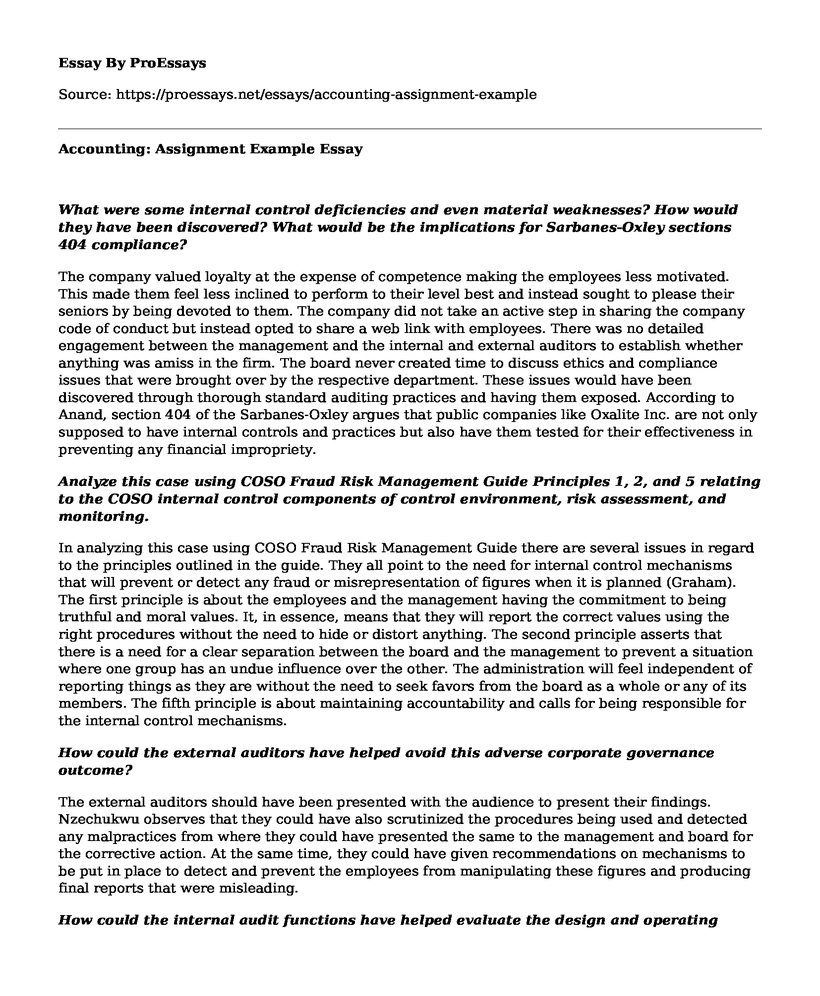What were some internal control deficiencies and even material weaknesses? How would they have been discovered? What would be the implications for Sarbanes-Oxley sections 404 compliance?
The company valued loyalty at the expense of competence making the employees less motivated. This made them feel less inclined to perform to their level best and instead sought to please their seniors by being devoted to them. The company did not take an active step in sharing the company code of conduct but instead opted to share a web link with employees. There was no detailed engagement between the management and the internal and external auditors to establish whether anything was amiss in the firm. The board never created time to discuss ethics and compliance issues that were brought over by the respective department. These issues would have been discovered through thorough standard auditing practices and having them exposed. According to Anand, section 404 of the Sarbanes-Oxley argues that public companies like Oxalite Inc. are not only supposed to have internal controls and practices but also have them tested for their effectiveness in preventing any financial impropriety.
Analyze this case using COSO Fraud Risk Management Guide Principles 1, 2, and 5 relating to the COSO internal control components of control environment, risk assessment, and monitoring.
In analyzing this case using COSO Fraud Risk Management Guide there are several issues in regard to the principles outlined in the guide. They all point to the need for internal control mechanisms that will prevent or detect any fraud or misrepresentation of figures when it is planned (Graham). The first principle is about the employees and the management having the commitment to being truthful and moral values. It, in essence, means that they will report the correct values using the right procedures without the need to hide or distort anything. The second principle asserts that there is a need for a clear separation between the board and the management to prevent a situation where one group has an undue influence over the other. The administration will feel independent of reporting things as they are without the need to seek favors from the board as a whole or any of its members. The fifth principle is about maintaining accountability and calls for being responsible for the internal control mechanisms.
How could the external auditors have helped avoid this adverse corporate governance outcome?
The external auditors should have been presented with the audience to present their findings. Nzechukwu observes that they could have also scrutinized the procedures being used and detected any malpractices from where they could have presented the same to the management and board for the corrective action. At the same time, they could have given recommendations on mechanisms to be put in place to detect and prevent the employees from manipulating these figures and producing final reports that were misleading.
How could the internal audit functions have helped evaluate the design and operating effectiveness of internal controls?
The internal audit could have helped in the situation by utilizing some functions to put in place some operating procedures to prevent the malpractices. They could have been performing reviews on the existing system to uncover some of its weaknesses and loops that could be exploited for the misconducts (Fountain). They also make recommendations on the daily activities that will end up improving on operations, finances, and governance and hence achieving the highest standards that eliminate the possibility of having any malpractices. They also monitor existing systems for compliance with the required operating procedures and practices.
Mr. N. G. Shanker, CAE of the Aditya Birla Group, a large conglomerate in India and a former member of the Internal Audit Standard Board of The IIA, has remarked, "Poor culture leads to organizational disaster." In what way was his observational justified in the case of Oxalite, Inc.?
The observation of a poor culture is right for this case because this is what to a great extent led to the poor organization. Instead of rewarding competence, they were rewarding the employees based on their loyalty. Therefore the signal that they were sending is that it is more important to show allegiance to the management that it is to do the right thing. The same applied to the compensation scheme that was based on the ones reporting good news irrespective of the mode used in producing them as compared to the ones who were following the right procedures and reporting poor results.
References
Anand, Sanjay. Essentials of Sarbanes-Oxley. Hoboken, N.J: Wiley, 2013. Internet resource.
Fountain, Lynn. Leading the Internal Audit Function: The Reality of Performing in Business Today. , 2016. Internet resource.
Graham, Lynford. Internal Control Audit and Compliance: Documentation and Testing Under the New Coso Framework. , 2015. Internet resource.
Nzechukwu, Patrick O. Internal Audit Practice from a to Z. , 2016. Internet resource.
Cite this page
Accounting: Assignment Example. (2022, Jul 01). Retrieved from https://proessays.net/essays/accounting-assignment-example
If you are the original author of this essay and no longer wish to have it published on the ProEssays website, please click below to request its removal:
- Marketing Budget of Tesla Inc Case Study
- US GAAP Versus IFRS Paper Example
- Sources and Uses of Cash Paper Example
- Accounting Fraud at WolrdCom Case Study Paper Example
- Kay Jewelers: Retail Repayment Credit Agreement Paper Example
- Paper Example on Balance Sheet: Liab., Assets & Stockholders' Equity
- Race, Prison Violence & Empirical Analysis: A Study







